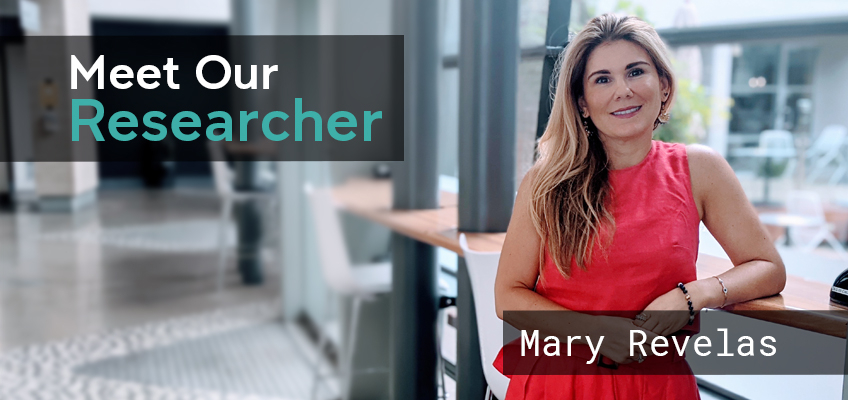02 Mar 2021

A PhD student in CHeBA’s Genetics & Epigenomics Group, Mary Revelas is researching the genetics of exceptional longevity to better understand successful ageing. Her work hopes to provide clarity on the genes strongly associated. Ultimately, an understanding of both genetic and lifestyle factors will be needed to disentangle the underlying mechanisms of long and healthy lives.
How did you get into researching the ageing brain?
Given my favourite school subjects were Biology and Science, it seemed natural to undertake a Bachelor of Science when continuing education after completing high school. I attended the University of the Witwatersrand in Gauteng, South Africa. At that time, tuberculosis was rampant and a primary cause of death among people who were HIV positive. The most widely used antibiotic was Rifampicin and multi-drug resistant strains were developing rapidly. Thus, the focus of my Masters in Microbial Genetics was to help characterise resistance to rifampicin via ADP-ribosylation by studying mutational alterations, specifically in the arr gene.
I loved researching something that I knew had the potential to facilitate the development of more potent antibacterial agents. I am particularly driven by knowing my research can be applied to change lives for the better.
Did you experience a ‘defining moment’ which led you to this field?
Ageing well has always interested me generally; however, one of the most inspiring moments for me personally was listening to the centenarians and near-centenarians (Mr Tom Sample, Mr Michael Harvey, Mrs Helena Goldstein and Ms Eileen Kramer) speak about their lives, daily habits and the secrets to their longevity during CHeBA’s Living to 100 Conference in Sydney, 2018. Even though I am researching the genetic basis to exceptional longevity, I will treasure this memory for a long time.

Do you have any personal interests or activities which are protective behaviours against cognitive decline?
I try and live all aspects of my life in moderation and believe that balance is the key to success. There are a number of lifestyle choices that I have adopted that are considered protective against cognitive decline. Regarding diet, I attempt to make healthy choices each day but don’t deprive myself of something sweet now and then. With regards to exercise, I find myself (like most individuals) time-poor - so my attitude is to try and be as active as possible when the opportunity presents itself with incidental exercise! Whether that is by taking the stairs as opposed to the elevator, playing a game of tip with my children or taking a longer nature walk over the weekends; I am conscious of being consistent. I have also started reading every night in favour of watching television and enjoy playing board games with my children. Complex mental activity is considered protective against cognitive decline so all of these activities are contributors to better brain health.
What are you currently researching?
I am currently investigating healthy metabolic measures and the dysregulation of these measures. I am looking to see if these are significantly associated with an individual’s personal genetic risk score to live to an old age. The independent cohorts considered are varied, ranging in age from 40 to 90 years of age, geographically diverse and large in sample size providing increased statistical power. The hypothesis is that individuals with a high genetic score for living a long life will be metabolically healthy providing them with a survival advantage.
Why is your research important?
I feel that my research is helping us to better understand the varied rates of ageing at the genetic level.
Knowledge is power and if we are able to better understand our own personalised risk, we are better equipped to manage it.
This research may reveal novel ageing pathways that help to promote healthy ageing. I love this quote I came across: “The aim is to die as young, as late as possible.”
What do you love about working for CHeBA?
I love CHeBA because it is unique – it has bought together so many incredibly talented researchers from many disciplines that never tire of helping to better understand healthy brain ageing. Everyone I have met is encouraging and always willing to give of their time and knowledge, which is vital in our success as everything is interrelated with biology. I am finding the Meet Our Researcher a great introduction to familiar faces which has been especially warming under the COVID-19 circumstances. The CHeBA Seminar Series and Visiting Lecture Series has been fascinating and a great opportunity to learn something new which may add to my research in the future.
What is the ultimate hope you have for your research?
My ultimate hope is to better understand the genetics of exceptional longevity and successful ageing and that this information can be utilised to help others live long and healthy lives.
This interview was undertaken during the COVID-19 work from home period. Mary Revelas found that having video calls with her family and friends supported her mental resilience and kept her feeling socially connected while physically isolated.
Donations are fundamental for critical research to continue following COVID-19.
If you would like to discuss supporting Mary Revelas' work specifically, or would like information
on leaving a legacy via a Gift in your Will, please contact h.douglass@unsw.edu.au.

Mary Revelas is a PhD student at CHeBA with the Genetics & Epigenomics Group. She is supervised by Dr Karen Mather and Dr Anbu Thalamuthu, working on a project to better understand the genetics of successful ageing. Mary completed a Bachelor of Science (Honours) at the University of the Witwatersrand.
